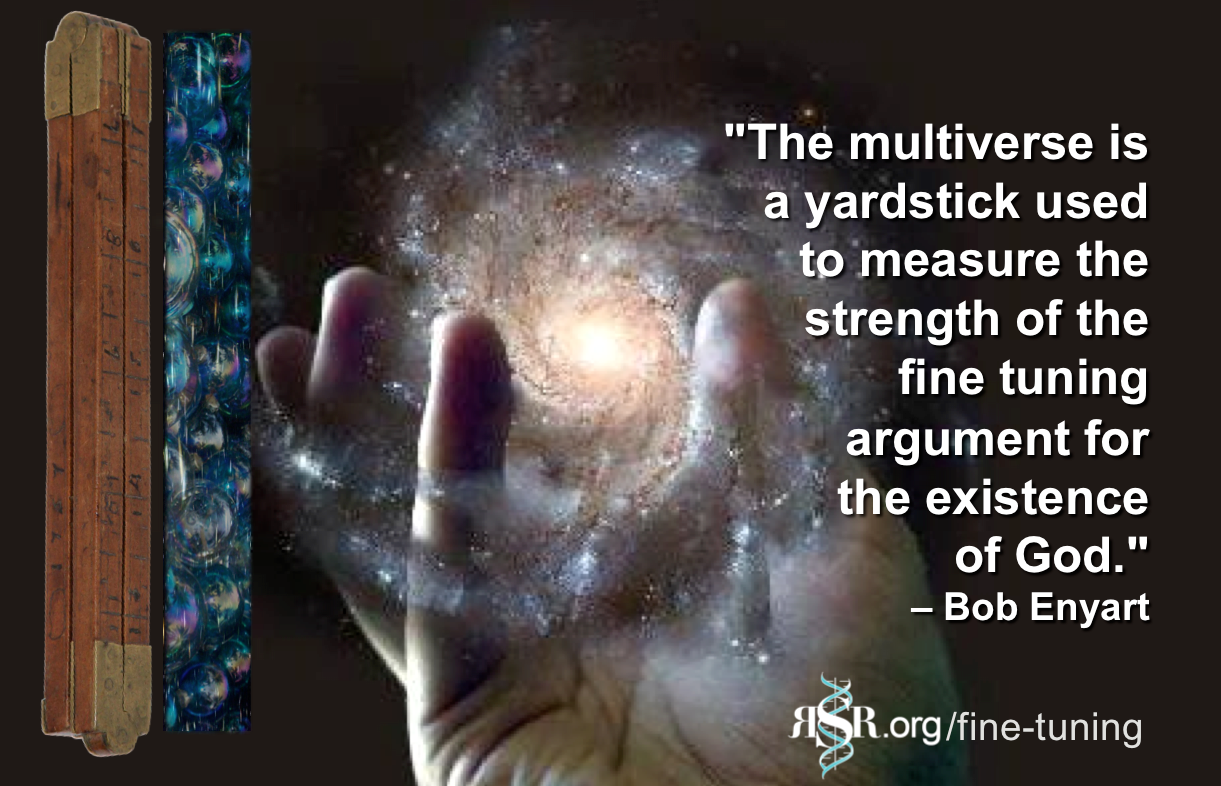 * The Big Bang and its Irrational Stepchildren, A Multiverse and Boltzmann Brains: "The multiverse is a measurement tool," said Real Science Radio host Bob Enyart. "The multiverse is a yardstick used to measure the strength of the fine tuning argument for God's existence. The speed of its acceptance measures atheist desperation." See our article, RSR on the Multiverse, just below. On today's program Enyart discusses the big problems with the big bang interviewing Spike Psarris, an electrical engineer formerly with the U.S. Military Space Program and currently, the producer of a fabulous video series, What You Aren't Being Told About Astronomy. In Part 2 of this interview, Bob and Spike discuss an absurd logical conclusion of the big bang's multiverse, namely, Boltzmann Brains.
* The Big Bang and its Irrational Stepchildren, A Multiverse and Boltzmann Brains: "The multiverse is a measurement tool," said Real Science Radio host Bob Enyart. "The multiverse is a yardstick used to measure the strength of the fine tuning argument for God's existence. The speed of its acceptance measures atheist desperation." See our article, RSR on the Multiverse, just below. On today's program Enyart discusses the big problems with the big bang interviewing Spike Psarris, an electrical engineer formerly with the U.S. Military Space Program and currently, the producer of a fabulous video series, What You Aren't Being Told About Astronomy. In Part 2 of this interview, Bob and Spike discuss an absurd logical conclusion of the big bang's multiverse, namely, Boltzmann Brains.
* RSR Programming Notes:
- Nov. 24 & 25: RSR's List of Big Bang Predictions
- SAVE THE DATE: Saturday, March 7, 2015: RSR's Big Bang Seminar in Indianapolis, Indiana

* RSR Talks With and About Spike Psarris:
- Spike Psarris: A Multiverse, Big Bang & Boltzmann Brains (this show)
- Spike Psarris on the Absurdity of the Multiverse (pt. 2)
- Honey Baby and Discover Mag's Phil Plait
- Spike Psarris on Astronomer Phil Plait and Evolution
- The Best Astronomy DVD Ever Made
Get a Real Astronomy Resource: Just browse the science department at our KGOV Store!
RSR on the Multiverse
* The Appeal of the Multiverse is as an Alternative to Design: The multiverse is a yardstick measuring the strength of the fine-tuning argument for God. It's acceptance measures atheist desperation. Thus ultimately, the multiverse is a measurement tool. In an RSR broadcast interview, Dr. Lawrence Krauss rejected Bob Enyart's observation that materialists were positing an infinite number of universes in order to explain apparent design. In fact, Krauss, who misrepresented himself and science repeatedly during that interview, claimed that he had never even heard of the multiverse used as a materialist explanation for fine tuning. (Then only moments later, he proposed the idea.)  * Miss Universe vs. Miss Multiverse: "Nothing in astronomy makes sense except in the light of the multiverse, which itself doesn't make sense," said Bob Enyart about secular cosmology paraphrasing Theodosius Dobzhansky. So beauty lies in the eyes so be older.
* Miss Universe vs. Miss Multiverse: "Nothing in astronomy makes sense except in the light of the multiverse, which itself doesn't make sense," said Bob Enyart about secular cosmology paraphrasing Theodosius Dobzhansky. So beauty lies in the eyes so be older.
* December 2014 Update from Nature: The journal Nature in an article by Joe Silk and Hawking co-author George Ellis points out:
The multiverse is motivated by a puzzle: why fundamental constants of nature, such as the fine-structure constant that characterizes the strength of electromagnetic interactions between particles and the cosmological constant associated with the acceleration of the expansion of the Universe, have values that lie in the small range that allows life to exist.
Ellis and Silk also point out the obvious, that promotion of the multiverse by astrophysicists "undermines science".
* Multiverse vs. God: A decade before our Krauss interview, Stephen Hawking associate and cosmologist George Ellis wrote with co-authors in the Monthly Notices of the Royal Astronomical Society, "The idea of a multiverse -- an ensemble of universes -- has received increasing attention in cosmology... as an explanation for why our universe appears to be fine-tuned for life and consciousness." And nearly three decades ago, back in 1985, the consummate astronomer, British cosmologist Ed Harrison, wrote, "Here is the cosmological proof of the existence of God – the design argument of Paley – updated and refurbished. The fine-tuning of the universe provides prima facie evidence of deistic design. Take your choice: blind chance that requires multitudes of universes or design that requires only one... Many scientists, when they admit their views, incline toward the teleological or design argument." Now fast forward to this year when biologist and fellow of both Cambridge University and of the Royal Society, Rupert Sheldrake, wrote, "To avoid a creator God emerging in a new guise, most leading cosmologists prefer to believe that our universe is one of a vast, and perhaps infinite, number of parallel universes..." So beginning at 9 minutes into today's broadcast Enyart asserted to Krauss that he and other atheists readily accept the notions of trillions upon trillions of universes assuming this gives them a possible explanation for the wildly unlikely finely tuned parameters (rsr.org/fine-tuning) of our universe. At 13:42 in, Krauss denied this. Enyart says, "The reason that so many astrophysicists, cosmologists, have gone to asserting the multiverse, that there are trillions upon trillions of universes, is because they say ours is such that, it is so wildly unlikely, there's no good reason for it to be here, unless there were septillions." Krauss "No, that's not the reason; no, no, that's not the case." This prompted Enyart to state, "Let me object, for the record..." And in denying that he had ever heard of the multiverse proposed solution as an answer for the fine-tuning problem, he then claimed that the multiverse is posited only because of string theory, and though he himself rejects string theory, yet he then claimed that there might indeed be an infinite number of universes. What a web we weave. Famed cosmologists John Barrow & Frank Tipler, on the back cover of their standard treatment, The Anthropic Cosmological Principle, "Could there be other universes? How large is the range of conceivable universes that can give rise to living observers?" On page 6 they write, "we are tempted to make statements of comparative reference regarding the properties of our observable Universe with respect to the alternative universes we can imagine possessing difference values [for] their fundamental constraints. But there is only one Universe [no?]; where do we find the other possible universes against which to compare our own in order to decide how fortunate it is that all these remarkable coincidences that are necessary for our own evolution actually exist?" See more RSR multiverse excerpts from this text, by cosmologists whom Lawrence Krauss knows very well.
* Krauss Never Heard of Alleged Fine-Tuning Multiverse Solution; Then Proposes It: At 14:40 into their radio broadcast, physicist Lawrence Krauss admitted to Bob Enyart, "something along the lines of what you're saying, namely, that if [certain fine tuning] were any different... so if [the fine tuning] is a random event, then if it were any different, we wouldn't be here. Now, I should say that that's a plausible and possible answer, resolution to that problem, and it's motivated in some sense by the possible existence of many universes, which are predicted by many particle physics theories." Then at 18 minutes in, Krauss again basically agrees with what he had been rejecting, saying, "There are many physicists who argue that the parameters of our universe are difficult to comprehend and many who predict the existence of many universes... We only exist in the universe with the parameters that allow life." This is not surprising because:
- Krauss' own book embraces the multiverse in Chapter 8: A Grand Accident
- Statistician and codger William Briggs noted last year that Krauss himself proposes multiple universes to explain ours.
On RSR, Krauss even stated that there might be infinite universes (which of course could include millions of universes wherein Lawrence was married to Hillary and elected president as Bill Krauss; millions of others wherein he was Chelsea's brother; and in all of which, atheists spend far too much time thinking about the Physics of Lost in Space).  Krauss and his associates were slow to the table though on the multiverse, which was not as supposed invented by physicist Hugh Everett, but, in modern times, a year earlier in 1956 by DC Comics. (While it is denied by people who have no idea, the Flash Showcase introductory comic book very well may have been read at Princeton. As for centuries old references to the multiverse, they begin with Aristotle's third century B.C. rejection of the possibility of multiple universes followed by Christian theologians surmising that God could create multiple universes if only He wanted to. Ryan Mullin's excellent Oxford text, The End of the Timeless God, lists these as including in the 1300s Nicole Oresme, Le Livre, 149-179, and in the 1600s Pierre Gassendi, Physiologia, 74-75.)
Krauss and his associates were slow to the table though on the multiverse, which was not as supposed invented by physicist Hugh Everett, but, in modern times, a year earlier in 1956 by DC Comics. (While it is denied by people who have no idea, the Flash Showcase introductory comic book very well may have been read at Princeton. As for centuries old references to the multiverse, they begin with Aristotle's third century B.C. rejection of the possibility of multiple universes followed by Christian theologians surmising that God could create multiple universes if only He wanted to. Ryan Mullin's excellent Oxford text, The End of the Timeless God, lists these as including in the 1300s Nicole Oresme, Le Livre, 149-179, and in the 1600s Pierre Gassendi, Physiologia, 74-75.)
 * Atheism, Not Physics, Leads to Belief in a Multiverse: Cosmologists like Lawrence Krauss claim that physics and the study of subatomic particles led to the multiverse. Alternatively, Real Science Radio argues that it is not particle physics but atheism which led to the proposal, and acceptance, of the multiverse. Prof. Peter Coveney and Roger Highfield in their popular book, The Arrow of Time, present the "many-worlds interpretation of quantum mechanics" (MWI, aka, the multiverse) as an alternative to the Copenhagen interpretation because whereas the science itself suggested the existence of God, a multiverse was viewed as a way out. At Princeton University in 1957 Hugh Everett working with Prof. John Wheeler proposed that, as in the wave-particle duality double-slit experiment, a photon (electron, etc.) doesn't pass through one slit or the other, but rather, the entire "universe splits into two" as its wave goes through both, and when an observer sees the collapse of its wave function, we're merely registering the outcome in our own universe. According to Coveney and Highfield, "Everett's many-worlds interpretation of quantum mechanics has found favour with many cosmologists because it removes the apparent necessity for an external observer. [For] the only observer who could collapse a conventional wavefunction of the universe must be God." (pp. 133-134) Incidentally, Everett's thesis affirms a "psycho-physical parallelism" which rejects the human soul and spirit for a purely physical mechanism, and New Scientist's review of a Tegmark book asks, has multiverse "cosmology veered towards something akin to religion? ... Multiverse champions seem quite happy, even eager, to invoke infinite numbers of other universes as mechanisms for explaining things we see in our own universe. In a sense, multiverse enthusiasts take a 'leap of faith'". Famed astronomer Seth Shostak, asking, "Who or what built the universe?" speaks of Stephen Hawking's claim that, "With gravity in place, the cosmos-as-we-know-it was just a matter of hanging out for a few billion years." And then Shostak observers:
* Atheism, Not Physics, Leads to Belief in a Multiverse: Cosmologists like Lawrence Krauss claim that physics and the study of subatomic particles led to the multiverse. Alternatively, Real Science Radio argues that it is not particle physics but atheism which led to the proposal, and acceptance, of the multiverse. Prof. Peter Coveney and Roger Highfield in their popular book, The Arrow of Time, present the "many-worlds interpretation of quantum mechanics" (MWI, aka, the multiverse) as an alternative to the Copenhagen interpretation because whereas the science itself suggested the existence of God, a multiverse was viewed as a way out. At Princeton University in 1957 Hugh Everett working with Prof. John Wheeler proposed that, as in the wave-particle duality double-slit experiment, a photon (electron, etc.) doesn't pass through one slit or the other, but rather, the entire "universe splits into two" as its wave goes through both, and when an observer sees the collapse of its wave function, we're merely registering the outcome in our own universe. According to Coveney and Highfield, "Everett's many-worlds interpretation of quantum mechanics has found favour with many cosmologists because it removes the apparent necessity for an external observer. [For] the only observer who could collapse a conventional wavefunction of the universe must be God." (pp. 133-134) Incidentally, Everett's thesis affirms a "psycho-physical parallelism" which rejects the human soul and spirit for a purely physical mechanism, and New Scientist's review of a Tegmark book asks, has multiverse "cosmology veered towards something akin to religion? ... Multiverse champions seem quite happy, even eager, to invoke infinite numbers of other universes as mechanisms for explaining things we see in our own universe. In a sense, multiverse enthusiasts take a 'leap of faith'". Famed astronomer Seth Shostak, asking, "Who or what built the universe?" speaks of Stephen Hawking's claim that, "With gravity in place, the cosmos-as-we-know-it was just a matter of hanging out for a few billion years." And then Shostak observers:
...this approach inevitably begs the question, "who designed gravity?" Isn't it remarkable that this gentle force seems so perfectly suited to the job of assembling a grand and habitable universe? And indeed... there are many other physical parameters that seem to be nicely adjusted for our presence. This is frequently referred to as a "fine tuning" of the cosmos. If, for instance, the charge on the electron were of a slightly different value, stars wouldn't work adequately, and you would be spared both this blog and your existence. Depending on your personal philosophies, you can either credit this custom fitting to the intentions of God, or go for Plan B. The latter posits a multiverse...
Thus the dislike of God is so unquestioned and intense among secular scientists that it motivated the initial proposal (though absurd) of parallel universes. Or, in the slightly veiled terminology of Max Tegmark: "Going from our universe to the Level I multiverse eliminates the need to specify initial conditions." Exactly.
* Stephen Hawking's Grand Scheme: The greatest "rescue device" of all time, a multiverse, is both a measure of the desperation of materialists and an admission of the power of the fine-tuning argument for God's existence. Yet in his misnamed Grand Design denial of the Designer, theoretical physicist Hawking offers the multiverse as his best explanation for where we all came from. In the chapters Choosing our Universe and The Apparent Miracle the authors offer the (irrational) multiverse as their alternative to the "old way" of crediting God with His creation.
* Multiverse vs. Bible Verse: "In the beginning God created" begins the first Bible verse. Krauss' objections aside, here's the multiverse alternative as described in the NY Times by Paul Davies:
Imagine you can play God and fiddle with the settings of the great cosmic machine. Turn this knob and make electrons a bit heavier; twiddle that one and make gravitation a trifle weaker. What would be the effect? ...there wouldn't be anyone around to see the result, because the existence of life depends rather critically on the actual settings that Mother Nature selected.
Scientists have long puzzled over this rather contrived state of affairs. Why is nature so ingeniously, one might even say suspiciously, friendly to life? What do the laws of physics care about life and consciousness that they should conspire to make a hospitable universe? It's almost as if a Grand Designer had it all figured out.
The fashionable scientific response to this cosmic conundrum is to invoke the so-called multiverse theory.
Exactly.
* RSR Archived Notice:
- Nov. 29, Saturday: RSR's Global Flood Seminar by Bob Enyart at Denver's historic Brown Palace, 9 a.m. - 4 p.m.
